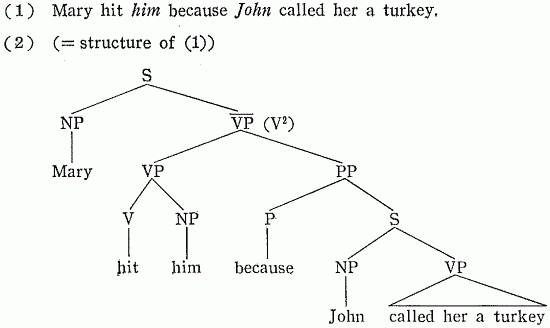英語の照応と副詞節:
統語論的分析の問題点と意味論的解決
1. Reinhart (1976, 1981, 1983) は,副詞節をすべて S の構成素と考えているが,because-, when-, after-, (durative) while 節などは VP (V2) の構成素であることを pseudo-clefts, VP-preposing, PP-preposing, VP-deletion などのテストを用いて明らかにした。その結果,次のような文の照応関係は適格であるのに対し,Reinhart の c-commandの 規定 (Reinhart (1976: 148, 1981: 612, 1983: 23)) では,him が John を c-command するため,事実に反して不適格と予測してしまう。

2. Chomsky (1981, 1982) の binding theory は,(1) のような例は説明できるものの,次のような対照的な例を説明することができない。
(3) a. Heno longer studies with us in this class since John has gone abroad on business.
b. *He played the flute since John felt very sad.
(4) a. She's intolerable when Mary goes into hysterics.
b. *She's intolerable when Mary talks about linguistics.
3. 以上のような対照的な例を説明するには,Bolinger (1979) の提唱する,副詞節が theme/rheme のいずれとして機能するかを考えることが重要であることを示し,さらにこれ以外に,主節と副詞節が表す意味内容に関して,その因果関係が強いか弱いかを考慮する必要があることを示し,次の仮説を提出した。
(5) The stronger the causal links between what the matrix and adverbial clauses express, the more likely it is that backward anaphora will be acceptable.
例えば,(3a) では John が外国へ行けば,当然彼はそれまで居た場所にはいなく,両節の関係は(logical) premise/consequence で結ばれている。 それに対し (3b) では,人が悲しくてもフルートを吹く必然性はなく,副詞節は,話し手が主節を述べる際の motivation として機能している。

